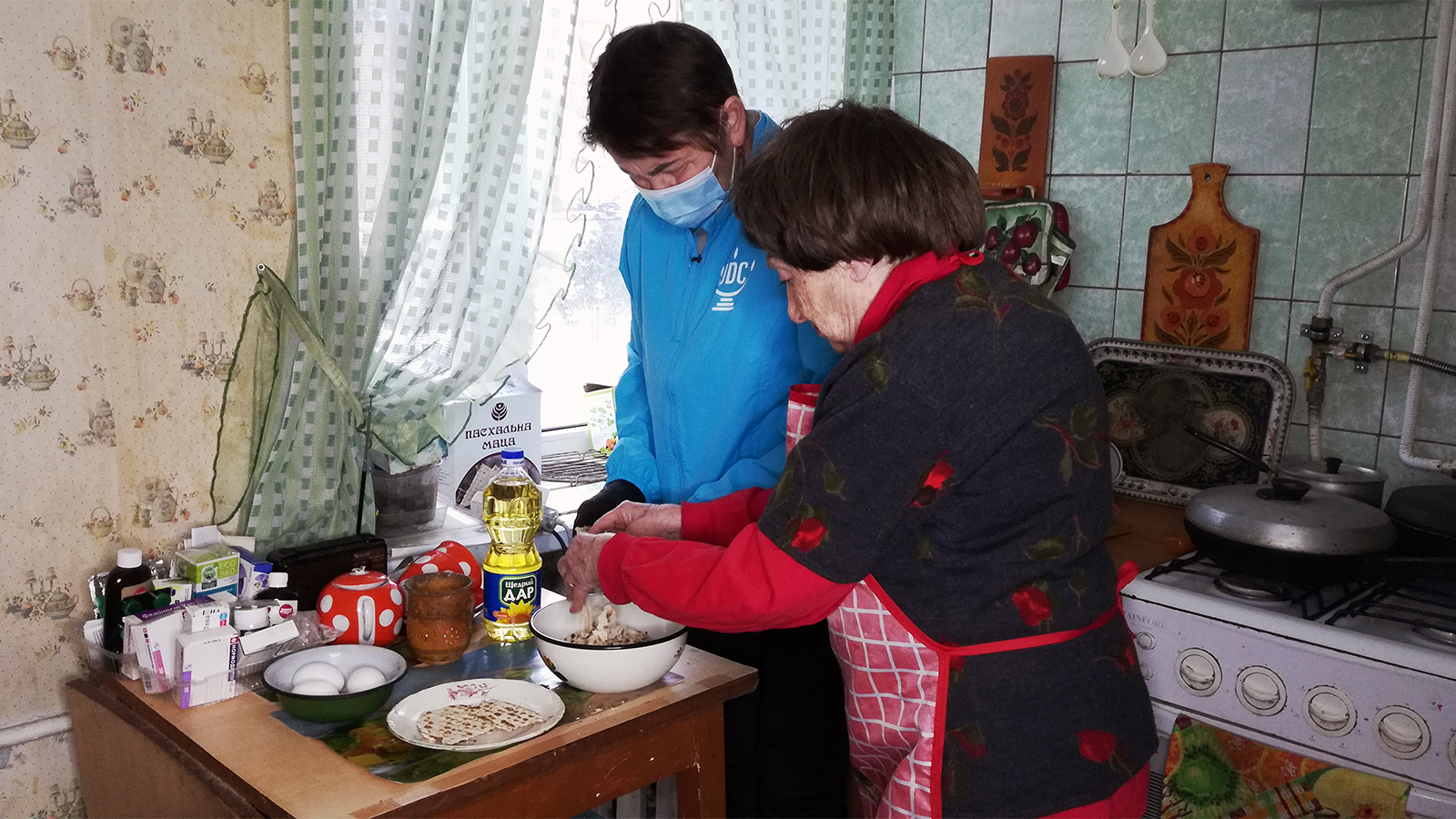(RNS) — This week, millions of Jews continue to celebrate Passover, the eight-day festival of freedom. Still under COVID-19 restrictions in many places, we’ll try to balance safety and tradition and imbue the holiday with new meaning by pushing the limits — and exploring the possibilities — of our newfound freedom: the slow emergence from the pandemic.
All of us would do well to take a lesson in that balancing act from Nina Belitskaya, an 89-year-old retired librarian from Poltava, Ukraine.
When Nina was 15, her parents sent her on a clandestine mission to pick up matzo from the unassuming little house on Pushkin Street. Defying a Soviet order against religious expression, the unauthorized factory was hidden in plain sight, producing the unleavened bread that Jews eat to celebrate Passover.
ARCHIVE: Passover’s promise of a safer place is America’s story this year
That year, Nina’s mother was ill, and her father, a Communist Party member, feared Stalin’s Great Purge. He couldn’t be caught entering the secret bakery — and so it fell on young Nina to secure the forbidden fare. Running home with the matzo held tightly to her chest, Nina was sure every pedestrian was staring at her, convinced that each passing comrade knew her crime. As soon as she got home, she burst into tears.
“I’ll never go for matzo again,” she told her parents. “Please don’t make me.”
It was decades later in 1994, when Nina was 63, that she celebrated her first Passover Seder. After her childhood brush with danger, she lived a normal life, working for more than 40 years as a teacher. But she never had a Jewish community around her until the Soviet Union collapsed and Jewish life and community institutions began to return to places like Poltava. That renaissance sparked Nina’s volunteer work as a librarian in her Jewish community over the past two and a half decades.
What’s more, eight decades after she dashed through the streets with contraband religious fare, Nina — like scores of other curious Jews hungry to reconnect to tradition — has learned how to bake matzo herself.

Nina Belitskaya, right, teaches a local Jewish volunteer who delivered a matzo box how to make matzo brei, a fried egg/matzo dish very popular among Ashkenazi Jews on Passover, in 2021. Photo courtesy of JDC
Matzo is a tricky, slippery symbol. Referred to as the “bread of affliction” in the Haggadah — the liturgy that recounts the Israelites’ harrowing exodus from Egypt and is read by Jews at their holiday tables — it’s also the first meal these former slaves ate as free people.
Across the former Soviet Union, in big cities and little villages, tens of thousands of Soviet Jews — a whole generation — cast off the shackles of a society that subjugated them and jubilantly built their own identity. Today there are an estimated 1 million Jews in the former Soviet republics, and we at the American Jewish Joint Distribution Committee rejoice that the next generation is increasingly writing its own Jewish story without worrying about government interference.
They’re serving the needy, teaching Jewish culture and traditions and enlisting their wider communities to help their neighbors endure COVID-19’s socioeconomic impact.
They have delivered food and medicines, connected the elderly and homebound to virtual events and celebrations and organized fundraising efforts for those who have lost jobs through volunteer centers and teen clubs that we created in partnership with the Genesis Philanthropy Group, BBYO teen movement and Jewish Federations.
In the long arc of their lives, Nina and her generation never expected to discover a cure for her own mitzrayim, the Hebrew word for Egypt that translates to the “narrow place.” But somehow, out of the constricted straits of Soviet oppression, they found freedom in building a Jewish life all their own and by improving the lives of others.
Nina’s journey teaches us that freedom is flimsy unless you share it with your community or work to build one for those still seeking connection. That truth is more important than ever as we look ahead to a future post-COVID-19.
As we watch with hope as friends and loved ones schedule vaccine appointments, or help others do the same, we need to realize that we can wriggle out of the narrow place, but only together. In the time ahead, all of us — Americans and those overseas — must not lose the momentum the pandemic has ignited in us. We must vow to keep volunteering in growing numbers, to continue donating to worthy causes, to persevere in our fight for a better society.
ARCHIVE: At Passover, Jews love matzo … until they don’t
We need to build out new communities we have found in our isolation — online, in our local neighborhoods or even around the world — and contribute to that elusive “common good.” Above all, we need to never stop savoring the simple pleasures denied to us: hugging our grandparents, celebrating big, joyful weddings and visiting loved ones on the other side of the country.
Freedom is more than a slogan or bumper sticker. It’s a promise and a responsibility, demanding that we recommit ourselves to each other, to community and to working for the collective future. That’s how the bread of this past year’s affliction becomes the recipe for our redemption.
(Alex Weisler is a video producer and digital storyteller at JDC, the global Jewish humanitarian organization. The views expressed in this commentary do not necessarily represent those of Religion News Service.)





